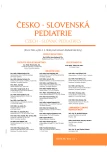-
Medical journals
- Career
Expanded carrier screening of recessive disorders (CarrierTest) in clinical practice
Authors: J. Diblík; M. Bittóová; F. Lhota; F. Zembol; L. Dohnalová; Z. Vilímová; I. Soldátová; M. Hrabíková; I. Pavlechová; M. Koudová; D. Stejskal
Authors‘ workplace: Centrum lékařské genetiky a reprodukční medicíny Gennet, s. r. o., Praha
Published in: Čes-slov Pediat 2020; 75 (1): 5-10.
Category:
Overview
Objective: To evaluate the introduction of expanded carrier screening for disorders with autosomal recessive inheritance within the frame of preconception care particularly in couples with infertility or recurrent pregnancy loss.
Methods: CarrierTest is a custom designed test based on amplicon sequencing of target regions in 77 genes for detection of 835 pathogenic mutations causing more than 61 inherited disorders.
Results: We have examined 10752 individuals from the investigated couples during the period considered. In total we have detected 3899 pathogenic variants, most often in following genes: GJB2 (in 4.9% of individuals), CFTR (3.6%), SERPINA1 (2.6%), DHCR7 (2.6%), SMN1 (2.5%), PAH (2.3%), NBN (1.8%), CYP21A2 (3.3%), ATP7B (1.2%), PMM2 (1.1%), ACADVL (1.1%) and ACADM (1%). We have found a high risk of autosomal recessive disorder in 67 couples (1.25%), most often both partners were carriers of mutations in GJB2 (18×), CFTR (13×), SMN1 (6×), CYP21A2 (6×), SERPINA1 (3×), PAH (3×), MEFV (3×), DHCR7 (2×), PMM2 (2×), ACADVL (2×), ACADM (2×), HEXA (2×) and ARSA (2×).
Conclusion: Results of CarrierTest provide the couples with information about the risk for their offspring. The severity of the risk differs depending on the gene and exact mutations. The findings thus must be assessed and communicated by a clinical geneticist so that couples can make informed decisions about further actions. The available preventive measures include preimplantation genetic testing, prenatal diagnosis as well as postnatal diagnosis (including prenatal screening) for early treatment.
Keywords:
Mutation – autosomal recessive inherited disorders – carrier status – preconception testing
Sources
1. Henneman L, Borry P, Chokoshvili D, et al. Responsible implementation of expanded carrier screening. Eur J Hum Genet 2016; 24 (6): e1–e12.
2. Gao Z, Waggoner D, Stephens M, et al. An estimate of the average number of recessive lethal mutations carried by humans. Genetics 2015; 199 (4): 1243–1254.
3. Lazarin G, Haque IS, Nazareth S, et al. An empirical estimate of carrier frequencies for 400+ causal Mendelian variants: results from an ethnically diverse clinical sample of 23,453 individuals. Genet Med 2013; 15 (3): 178–186.
4. Stejskal D. Klinická genetika ve 21. století. Cas Lek Cesk 2019; 158 (1): 4–8.
5. Chokoshvili D, Vears D, Borry P. Expanded carrier screening for monogenic disorders: where are we now? Prenat Diagn 2018; 38 (1): 59–66.
6. Pešková K, Chrastina P, Bártl J, et al. Novorozenecký screening dědičných metabolických poruch v České republice. Čes-slov Pediat 2018; 73 (6): 390–394.
7. Shen J, Oza AM, del Castillo I, et al. Consensus interpretation of the p.Met34Thr and p.Val37Ile variants in GJB2 by the ClinGen Hearing Loss Expert Panel. Genet Med 2019; 21 (11): 2442–2452.
8. Jezela-Stanek A, Ciara E, Małunowicz E, et al. Differences between predicted and established diagnoses of Smith-Lemli-Opitz syndrome in the Polish population: Underdiagnosis or loss of affected fetuses? J Inherit Metab Dis 2010; 33(Suppl 3): 241–248.
9. Rożnowski K, Januszkiewicz-Lewandowska D, Mosor M, et al. I171V germline mutation in the NBS1 gene significantly increases risk of breast cancer. Breast Cancer Res Treat 2008; 110 (2): 343–348.
10. Vrzalová Z, Hrubá Z, Hrabincová ES, et al. Chimeric CYP21A1P//CYP21A2 genes identified in Czech patients with congenital adrenal hyperplasia. Eur J Med Genet 2011; 54 (2): 112–117.
11. Novotná D, Vinohradská H, Hrubá Z. Deficit 21-hydroxylázy s genotypem p.I173N//chimérní gen CYP21A1P/CYP21A2 před a po screeningu. Čes-slov Pediat 2018; 73 (2): 95–99.
12. Borsatto T, Sperb-Ludwig F, Blom HJ, Schwartz IVD. Effect of BTD gene variants on in vitro biotinidase activity. Mol Genet Metab 2019; 127 (4): 361–367.
13. Harper JC, Aittomäki K, Borry P, et al. Recent developments in genetics and medically assisted reproduction: from research to clinical applications. Eur J Hum Genet 2017; 26 (1): 1–22.
Labels
Neonatology Paediatrics General practitioner for children and adolescents
Article was published inCzech-Slovak Pediatrics

2020 Issue 1-
All articles in this issue
- Editorial: Česko-slovenská Pediatrie v roce 2020
- Editorial: Současné možnosti genetické diagnostiky
- Expanded carrier screening of recessive disorders (CarrierTest) in clinical practice
- Children born after assisted reproduction in the Czech Republic in 2013–2015
- Congenital and hereditary diseases of respiratory tract from genetician’s view
- Genetic causes of sudden infant death syndrome in the era of next generation sequencing.
- Inherited arrhythmic syndromes in children
- It is never too late – HSV1-induced herepetic encephalitis
- Oxytocin and obesity
- Poděkování spolupracovníkům za rok 2019
- Czech-Slovak Pediatrics
- Journal archive
- Current issue
- Online only
- About the journal
Most read in this issue- It is never too late – HSV1-induced herepetic encephalitis
- Inherited arrhythmic syndromes in children
- Genetic causes of sudden infant death syndrome in the era of next generation sequencing.
- Expanded carrier screening of recessive disorders (CarrierTest) in clinical practice
Login#ADS_BOTTOM_SCRIPTS#Forgotten passwordEnter the email address that you registered with. We will send you instructions on how to set a new password.
- Career

